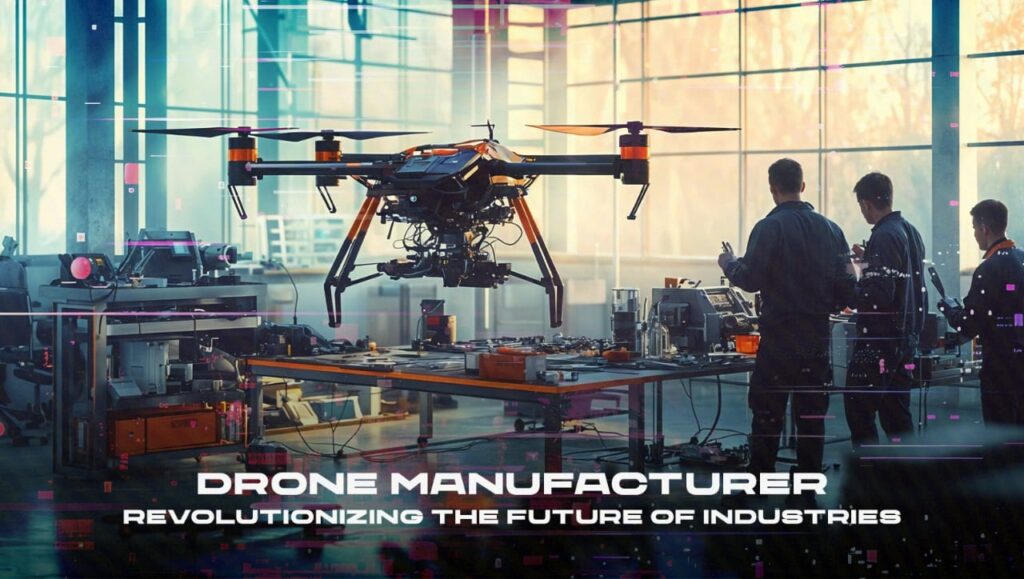
Drone Manufacturer: Revolutionizing the Future of Industries
In today’s world, technological advancements are shaping our lives unprecedentedly, revolutionizing industries and enhancing productivity across various sectors. One technology that has captured widespread attention for its diverse applications is the drone. Initially viewed as a leisure gadget, drones have rapidly evolved, impacting numerous industries. Drones are now integral to photography, filmmaking, delivery services, military operations, and agricultural crop monitoring. Behind these advancements is the drone manufacturer, a key player in crafting versatile, advanced, intelligent machines capable of transforming industries’ functions.
How Do Drone Manufacturers Work?
Manufacturing drones requires detailed research and a deep understanding of market trends and customer needs. A drone manufacturer must be aware of emerging technologies and innovations to meet the specific demands of diverse industries. Manufacturers shoulder responsibilities from research and design to training workers and assembling drones.
The process begins with market research, allowing manufacturers to gather insights into consumer and business demands. Next, drone manufacturers employ teams of technological experts responsible for creating various parts such as video-processing chips, advanced sensors, computer systems, high-resolution cameras, and software for smooth operations.
Once blueprints and technical specifications are finalized, assembly workers meticulously assemble the drones using hand tools and machines. Quality assurance is critical during this stage, and quality-control inspectors rigorously test each drone’s functionality, durability, and efficiency to ensure it meets industry standards.
Types of Drone Manufacturers
Drone manufacturing is diverse, with different types of manufacturers catering to specific industry needs. Here’s an overview of the various types of drone manufacturers:
- Consumer Drone Manufacturers: These drones primarily target travel photographers, videographers, and hobbyists. Equipped with high-definition (HD) cameras, GPS systems, and user-friendly controls, consumer drones are known for features like automated flight modes and battery-saving technologies. While often used for recreational purposes, these drones are also used in content creation and personal projects.
- Commercial Drone Manufacturers: Commercial drones are designed for professional applications such as real estate photography, surveying, mapping, and agriculture. They are integrated with advanced sensors, task automation features, and specialized software, allowing more precise data collection and analysis. These drones are crucial in improving efficiency in farming, infrastructure inspections, and environmental monitoring.
- Industrial Drone Manufacturers: Industrial drones are built for heavy-duty mining, construction, and infrastructure development applications. These drones are made to withstand harsh weather conditions and are often equipped with advanced tools like LiDAR sensors, gas detectors, thermal cameras, and data analytics software. Their role in industries like mining and construction continues to expand as they can access difficult or dangerous areas safely and efficiently.
- Agricultural Drone Manufacturers: The agricultural sector has embraced drones to enhance crop production and efficiency. Agricultural drones have sprayers, high-resolution cameras, and advanced sensors for crop monitoring, spraying, and surveying large land areas. Drones are crucial in modern farming, helping farmers optimize water usage, pesticide application, and crop health monitoring, leading to better yields and sustainability.
- Military Drone Manufacturers: Military drones are highly specialized and designed for defence operations, surveillance, and tactical missions. These drones are durable and often equipped with radar sensors, advanced imagery systems, GPS, and weapon systems. Military drones are also known for their long-range capabilities, allowing them to conduct surveillance, reconnaissance, and even targeted strikes in critical defence missions.
The Future of Drone Manufacturing
As the demand for drones grows, manufacturers constantly innovate and push boundaries to create more advanced drones that cater to evolving industry needs. The future of drone manufacturing is promising, driven by several key trends:
- Integration of AI and Machine Learning
One of the most exciting future developments in drone technology is integrating artificial intelligence (AI) and machine learning (ML). AI will enable drones to operate autonomously, allowing them to navigate complex environments, avoid obstacles, and make real-time decisions without human intervention. AI-powered drones can optimize their flight paths, improving efficiency in tasks like surveying or delivery.
Machine learning will allow drones to learn from past experiences, continuously improving their accuracy and performance. In industries like agriculture, drones could use machine learning to identify better crop diseases or areas needing attention, thereby enhancing the overall farming process.
- Enhanced Automation and Swarm Technology
Drones are becoming more autonomous, particularly in industries like logistics and agriculture, where repetitive tasks are common. Automated drones can handle deliveries, inspections, and monitoring with minimal human supervision, reducing operational costs and increasing productivity.
In the future, drone swarms—multiple drones working together—will become a reality, enhancing capabilities like search and rescue missions, mapping large areas, and infrastructure inspections.
- Longer Battery Life and Alternative Power Sources
One of the drones’ current limitations is their battery life. However, advances in battery technology will soon allow drones to fly longer on a single charge, improving operational efficiency. In addition, manufacturers are exploring solar-powered drones, which could fly for extended periods, beneficial for long-term projects like environmental monitoring.
- 5G Connectivity
Introducing 5G networks will dramatically enhance drone operations, allowing faster data transfer, real-time video streaming, and better coordination between drones and ground control. This technology will be beneficial in applications like disaster response, real-time surveillance, and urban delivery services.
- Sustainable Manufacturing Practices
With a growing focus on environmental sustainability, drone manufacturers are turning to eco-friendly materials and energy-efficient production processes. Future drones will be designed with recyclability in mind, aligning with the global push for greener technologies.
Conclusion: Shaping the Future with Innovation
Drone manufacturers are leading a technological revolution, driving innovation across various industries. From improving agricultural productivity to enhancing military surveillance and advancing industrial capabilities, drone technology transforms how we work and live. As manufacturers continue to innovate and embrace new trends like AI, 5G, and sustainability, the future of drone technology looks brighter than ever.
The journey of drones from leisure tools to essential industrial machines highlights the critical role manufacturers play in shaping the future of technology. As demand for drones continues to grow, manufacturers will keep pushing the boundaries of what’s possible, helping us unlock the full potential of this transformative technology.

